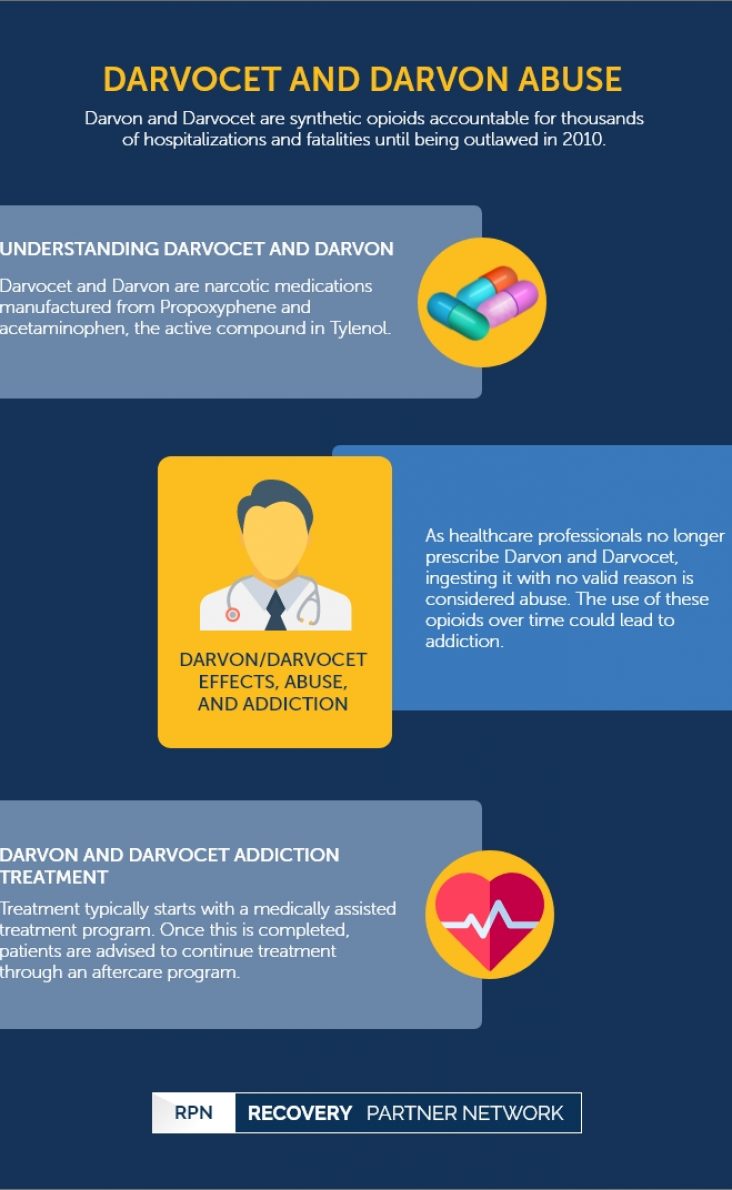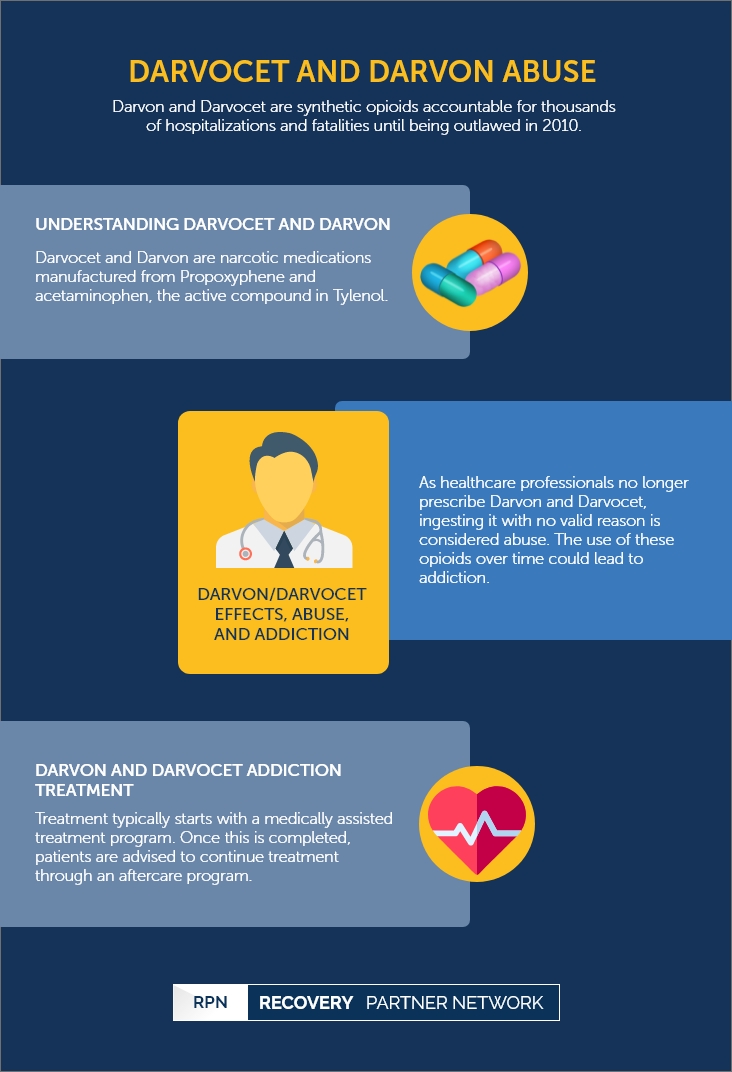Darvon and Darvocet are synthetic opioids accountable for thousands of hospitalizations and fatalities until being outlawed in 2010.
Darvocet and Darvon Abuse
Opioid
- Hydrocodone/paracetamol addiction
- Buprenorphine/Naloxone addiction
- Central nervous system depressant
- Codeine addiction
- Dextropropoxyphene addiction
- Fentanyl abuse
- Hydromorphone addiction
- How Long do Opioids Stay in Your System?
- Hydrocodone addiction
- Kava addiction and abuse
- Loperamide addiction
- Lortab addiction
- Medical prescription opioid
- Methadone addiction
- Morphine addiction
- Norco addiction
- NyQuil addiction
- Opioid use disorder
- OTC substance abuse
- Oxycodone addiction
- Oxycodone/paracetamol addiction
- Opioid epidemic
- Lean addiction
- Pethidine addiction
- Snorting Oxycodone
- Synthetic Opioids
- Tramadol addiction
Dextropropoxyphene addiction | Table of Contents
Understanding Darvocet and Darvon
Once marketed as mild to moderate pain relievers, Darvocet and Darvon are narcotic medications manufactured from Propoxyphene and acetaminophen, the active compound in Tylenol. These medications were once prescribed to patients suffering from severe migraines.
Due to numerous deaths caused by the medication in 2010, the Food and Drug Administration (FDA) prevented propoxyphene-based drugs from being further prescribed. However, synthetic opioids, such as Darvocet and Darvon, may still be found illegally. Slang names for Darvon/Darvocet include pinks, 65’s, footballs, and N’s.
FAQ
Darvocet is used to alleviate mild to moderate pain with or without fever.
The Food and Drug Administration (FDA) prevented Darvocet from being prescribed since 2010.
The decision to recall the drug was put forth by the FDA after concluding that the serious cardiac side effects of the drug overshadow the treatment efficacy of the painkillers.
Darvon/Darvocet Effects, Abuse, and Addiction
Darvon and Darvocet are controlled-release drugs that quickly dissolve into the bloodstream once taken orally. When considering the drugs’ effects, the FDA has recognized a range of concerning adverse effects in consumers of propoxyphene drugs.
Serious side effects of Darvocet may include:
- Confusion, unusual thoughts or behavior
- Seizure (convulsions)
- Nausea, stomach pain, and itching
- Dark urine, loss of appetite, and clay-colored stools
- Jaundice (yellowing of the skin or eyes)
- Shallow breathing, slow heartbeat, or irregular heartbeat
- Feeling like you might pass out
- Chest pain and feeling short of breath
Less serious Darvocet side effects include:
- Mild nausea, vomiting, upset stomach, and constipation
- Feeling dizzy or drowsy
- Headache and blurred vision
- Dry mouth
Darvon and Darvocet also contain a high risk of abuse and addiction. These drugs are usually abused by crushing it to a powder and snorting it, causing the drug’s time-release features to neutralize and flood the brain with the narcotic substances. An individual who abuses the drug in this form will initially experience a rush of euphoria followed by a sedated sensation that could last for up to four to six hours.
Few of the physical and psychological symptoms of Darvon/Darvocet abuse are:
- Drowsiness
- Dizziness
- Confusion
- Hallucinations
- Jaundice
- Skin rashes
- Blurred vision
- Headaches
- Unexplainable extended periods of sleep
- Sudden mood swings
- Delusions of grandeur
- Calm and relaxed feelings
- Frenzy-type behavior
- Loss of appetite and stability
- Dry mouth
As healthcare professionals no longer prescribe Darvon and Darvocet, ingesting it with no valid reason is considered abuse. The other primary sign of Darvon or Darvocet addiction is the formation of tolerance and dependence on the drug’s effects. Individuals abusing Darvon or Darvocet may gradually require higher doses of the drug to enjoy the same euphoria as before. Individuals who form a dependence will require the drug to function normally on a daily basis as their body has grown accustomed to the chemical changes. The development of tolerance and dependence is the initial stage of addiction.
The consumption of Darvon and Darvocet can also intensify pre-existing feelings of depression or thoughts of suicide. These drugs are central-nervous-system depressants, and as such, combining it with other depressants such as alcohol can lead to fatal respiratory failure, seizures, coma, or even death.
Recognizing a Darvon or Darvocet Addiction
Opiate addiction can develop rather quickly, along with traits of physical and psychological dependence. The Diagnostic and Statistical Manual of Mental Disorders has put forth the criteria that help recognize addiction to any substance. Accordingly, the symptoms of Darvon and Darvocet addiction are:
- Displaying an intense craving for the substance.
- Consuming the drug in a manner that intensifies its effect.
- Obsessing over the next dose.
- Engaging in unethical or dangerous behaviors to obtain the drug.
- Strained or troubled relationships with family and friends.
- Neglecting obligations and responsibilities at home and at work.
- Sudden mood changes and behavioral changes.
- Excessive sleeping.
Darvon and Darvocet Abuse Statistics
- Reports had identified approximately 20 million Darvon users before the drug was officially banned.
- In 2008, around 16,000 hospitalizations were related to Darvocet misuse.
- Since 1981, around 10,000 individuals have died due to Darvocet overdose.
- Before banning the drug from further prescriptions, the Drug Enforcement Administration (DEA) had listed Darvon as one of the top-ten abused drugs in the US.
Darvon and Darvocet Withdrawal and Detox
Medically-supervised, inpatient detox programs are vital to tackle Darvon or Darvocet withdrawal symptoms due to their intensity. During treatment, individuals will also undergo associated group therapies and counseling to assist them in addressing the psychological dependence on the drug. Depending on the severity of the addiction, patients may later be advised to seek further treatment at an outpatient treatment program or aftercare program.
The withdrawal symptoms of Darvon or Darvocet may include:
- Intense physical or psychological cravings for the substance
- Anxiety
- Fatigue
- Nausea
- Diarrhea
- Body pains
- Restlessness
- Crawling sensations on the skin
- Paranoia
- Restless legs syndrome
- Poor concentration
- Stomach aches
- Profuse sweating
- Insomnia
- Mild tremors
- Dreams about the drugs
- Muscle spasms
- Depression
- Loss of appetite
- Sudden mood swings
- Racing thoughts
Darvon and Darvocet Addiction Treatment
Treatment centers that specialize in these addictions offer both inpatient and outpatient rehab programs to equip patients with the necessary tools to cope with withdrawal and the associated psychological impacts. Treatment for Darvon or Darvocet addiction typically starts with a medically-assisted treatment program. This program allows medical professionals to monitor their patients and intervene during complications to ensure the safety of each patient.
Breaking free from a Propoxyphene-based drug can be quite difficult and challenging as it may inevitably trigger frequent relapses. Therefore, patients are always advised to maintain treatment through an aftercare program after the completion of inpatient and outpatient treatment. Aftercare programs provide recovering patients access to support groups and individual and group counseling. Aftercare programs are a vital component of addiction treatment as it provides patients with a life long support required to fight a life long disease.
Recovery Partner Network
We aim to educate and empower. If you feel our library of resources does not cover your specific need, reach out to us, and we would be happy to help.
STATISTICS
© Copyright 2026


